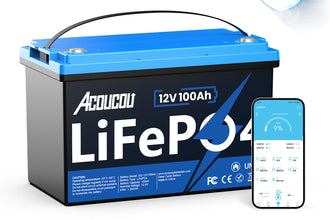

As the popularity of RVs continues to soar, the need for efficient and reliable methods to charge these modern homes-on-wheels becomes increasingly vital. Whether embarking on a cross-country road trip or enjoying an extended stay at a scenic campground, RV enthusiasts rely on various charging methods to power their vehicles. In this article, we'll explore several effective techniques for charging RVs, catering to diverse power needs and camping preferences.
Shore Power
One of the most common and convenient methods for charging an RV is through shore power. There are two ways to use shore power. First, most RVs are equipped with a shore power cord that can be plugged into a 120V AC electrical outlet at a campground or RV park and the converter changes AC power to DC power. Second, it is the battery charger. It is best to use the charger equipped with your battery. If you use an incompatible charger, it may cause damage to the battery and its performance.
This direct access to electricity not only powers the RV's appliances but also recharges its batteries, providing a reliable source of energy during stays at established camping sites.
Generator Power
For off-grid adventures or when shore power is unavailable, many RVs are equipped with onboard generators. These generators can be powered by gasoline, diesel, propane, or even solar energy, offering a versatile solution for generating electricity on the go. Whether camping in remote locations or during power outages, the onboard generator serves as a valuable resource for charging the RV's batteries and ensuring continuous power supply.
- Portable Gasoline Generators:These generators are popular for RV use due to their affordability and availability. They run on gasoline and provide AC power. Portable gasoline generators come in various sizes and power outputs, allowing you to choose one that suits your RV's battery charging needs.
- Propane Generators:Propane generators are another option for charging RV batteries. They use propane as fuel and produce AC power. Propane is often preferred by some RV owners because it is cleaner burning than gasoline and has a longer shelf life.
- Diesel Generators:Diesel generators are known for their fuel efficiency and durability. They operate on diesel fuel and generate AC power. While they tend to be more expensive upfront, diesel generators can provide a reliable power source for charging RV batteries.
Solar power
An increasingly popular sustainable option for charging RVs is the installation of solar panels on the vehicle's roof. Harnessing the sun's energy, solar panels provide a renewable and environmentally friendly source of electricity, particularly beneficial for boondocking or dry camping where access to shore power or a generator may be limited. Solar power not only charges the RV's batteries but also reduces reliance on non-renewable energy sources, making it an attractive option for eco-conscious travelers.
Acoucou LiFePO4 batteries are lighter than other batteries so that the load of your RV can be reduced. Meanwhile, it can accompany you on longer journeys owning to the metal case and 6000+ deep cycles, and you will have a different and unique experience. Let’s make a simple solar system with Acoucou.

Battery Charger
In cases where external power sources are available, such as a generator or shore power, a battery charger can be employed to directly charge the RV's batteries. This method offers flexibility and efficiency, allowing RV owners to replenish their battery reserves without relying solely on the RV's built-in charging systems.
A DC-DC charger for RVs is a device used to charge the RV house battery while driving or when connected to a tow vehicle. It converts the vehicle's 12V DC power into a higher voltage suitable for charging the RV's battery system. Using a DC-DC charger for your RV provides a reliable and efficient way to charge the house battery while on the road. It offers better control over the charging process and helps protect the battery, ensuring a longer lifespan and optimal performance.

Tow vehicle 12v feed
This only applies to travel trailers and fifth wheels, which have trailer wiring connections that enable the lights and turn signals operated in the tow vehicle to also cause the trailer to match. Larger trailers typically come equipped with a 7-prong connector. The connection between the outlet and trailer cord plug allows for an "auxiliary power" connection. When correctly wired, this connection can supply a 12-volt power feed from the tow vehicle's alternator, which is responsible for charging the truck battery, and send additional power back to the RV.
As the RV community continues to evolve, advancements in charging technology and renewable energy solutions will further enhance the travel experience for enthusiasts. Acoucou is also constantly committed to developing more durable and clean RV batteries, paving the way for a more sustainable and efficient future in RV camping.










